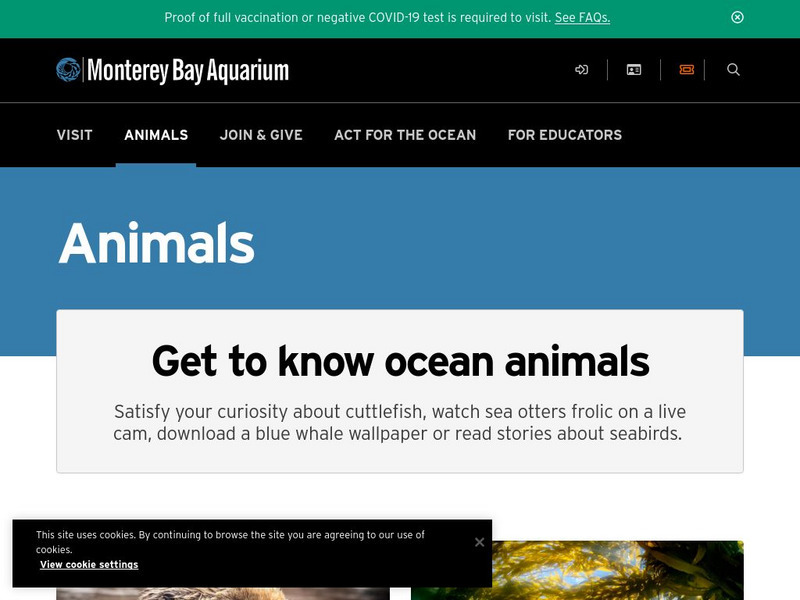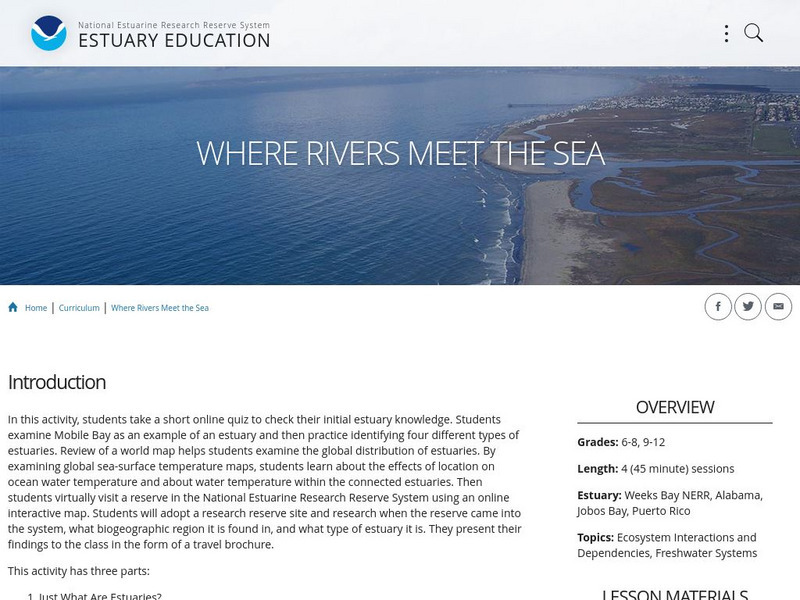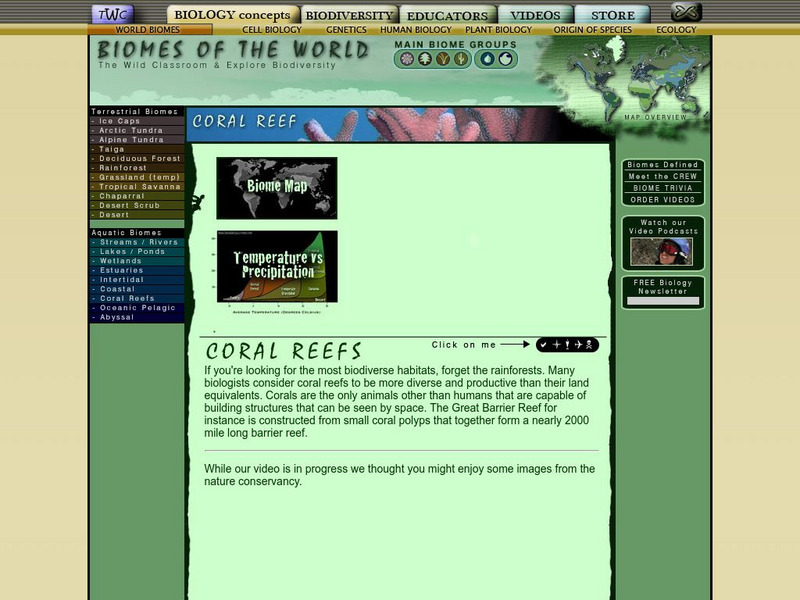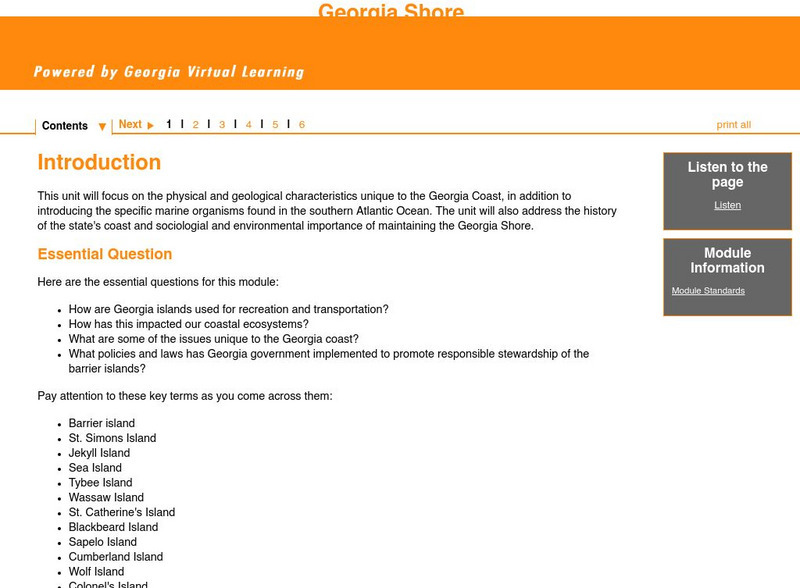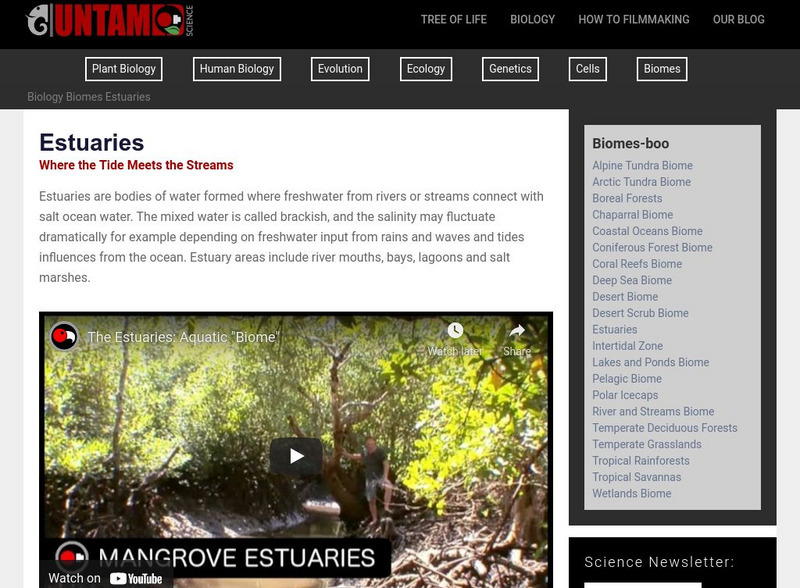TED Talks
Ted: Ted Ed: Underwater Astonishments
David Gallo shows jaw-dropping footage of amazing sea creatures, including a color-shifting cuttlefish, a perfectly camouflaged octopus, and a Times Square's worth of neon light displays from fish who live in the blackest depths of the...
Tom Richey
Slide Share: Ecosystems and You
Slideshow that looks at energy flow in an ecosystem. Explains what an ecosystem is, how energy flows through it, the producers and consumers of energy, and food chains. Links to a video about plastic debris in the ocean.
Missouri Botanical Garden
Missouri Botanical Garden: How the Ocean Refreshes Itself
Watch the animated illustrations to see how the nutrients at the bottom of the ocean get circulated to the top. This upwelling is necessary in order to maintain a healthy ocean.
NOAA
Noaa: Motion From the Ocean [Pdf]
Reel in some information about fish from the ocean. Then create a mobile with fish that you color.
CK-12 Foundation
Ck 12: Life Science: Effects of Water Pollution
[Free Registration/Login may be required to access all resource tools.] Water pollutants can have an effect on both the ecology of ecosystems and on humans. As a result of water pollution, humans may not be able to use a waterway for...
Monterey Bay Aquarium
Monterey Bay Aquarium: Animal Guide
An extensive image-rich field guide to marine habitats and inhabitants, with detailed descriptions and "cool facts" about each.
NOAA
Noaa: Ocean Explorer: Keeping Watch on Coral Reefs
Students read coral reef tutorials, describe the role of satellites, analyze oceanographic data, and identify actions to reduce threats to these fragile ecosystems. Their goal is to ultimately produce a public education program about...
NOAA
Noaa: Ocean Facts on Marine Fish Habitats
The depletion of marine fish habitats from NOAA affects more than just the fish - it can affect you too! Learn facts about the importance of habitat preservation for science, and for people like you.
Georgia Department of Education
Ga Virtual Learning: Marine Invertebrates
Students learn about invertebrates found in the ocean, their individual methods of adaptations, identifying characteristics, and contributions to the marine ecosystem.
University of California
Ucmp: The World's Biomes
The University of California Museum of Paleontology hosts this site devoted to the study of the earth's biomes, which are the world's major communities, classified according to the predominant vegetation and adaptations of organisms to...
National Geographic
National Geographic: Coral Reef Fish Survey Simulation
Students will learn surveying methods for an ecosystem through a short video. The video focuses on exploring the number and types of fish and the health of the coral reef ecosystem. Site includes a lesson plan and activity worksheet.
Other
Winston Salem/forsyth Schools: Neritic Zone
This 25-page teacher resource (Word document) offers information and discussion questions on the ocean's neritic zone.
Georgia Department of Education
Ga Virtual Learning: Marine Vertebrates
Learn about vertebrates found in the ocean, their individual methods of adaptations, identifying characteristics and contributions to the marine ecosystem.
NOAA
Noaa: Estuaries 101 Curriculum: Where Rivers Meet the Sea
A complete learning module where students watch an introductory video, take an estuary quiz, learn about landforms related to the environment, and use maps and real-time data to study estuary ecosystems in the United States.
Untamed Science
Untamed Science: Biology: World Biomes: Pelagic Biome
Learn about the different zones of the open ocean, the pelagic biome, and what organisms call each zone home.
The Wild Classroom
The Wild Classroom: Biomes of the World: Coral Reef Biome
Learn about the coral reef ecosystem. Find out about plants, animals, adaptations, and conservation efforts.
Georgia Department of Education
Ga Virtual Learning: Georgia Shore
Find out about the physical and geological characteristics unique to the Georgia Coast, in addition to the specific marine organisms found in the southern Atlantic Ocean. Also learn the history of the state's coast and sociological and...
The Wild Classroom
The Wild Classroom: Biomes of the World: Intertidal Zone
Learn about the intertidal ecosystem. Find out about plants, animals, adaptations, and conservation efforts.
Untamed Science
Untamed Science: Biology: World Biomes: Estuaries Biome
Make learning about Earth's biomes fun and easy with video clips, photographs, and diagrams. Learn about estuaries, the water environments formed where freshwater from rivers or streams mix salt ocean water. [6:38]
Scholastic
Scholastic: Ocean Life
Good starting point for researching ocean life. Find general information, research-topic ideas, a glossary of important terms and people, and numerous links to related sites.
Untamed Science
Untamed Science: Biology: World Biomes: Coastal Oceans Biome
Explore photos, watch video clips, and learn about the aquatic biome located above the continental shelf. [8:37]
American Museum of Natural History
American Museum of Natural History: O Logy: Marine Biology: The Living Oceans
This resource is a place for exploring, asking questions, finding information, meeting scientists, and learning about marine ecosystems.
University of Florida
Florida Museum of Natural History: Shark Basics
You will find the most commonly asked shark questions in this comprehensive site. Topics include shark basics, shark biology, shark conservation, shark attacks, and shark research.
Ducksters
Ducksters: Science for Kids: Marine or Ocean Biome
Kids learn about the marine biome. The largest biome by far, the oceans cover most of the Earth's surface.
Other popular searches
- Ocean Ecosystems Animals
- Arctic Ocean Ecosystems
- Ocean Ecosystems Activities
- Five Ocean Ecosystems
- Ocean Ecosystems Worksheets





![Noaa: Motion From the Ocean [Pdf] Activity Noaa: Motion From the Ocean [Pdf] Activity](https://d15y2dacu3jp90.cloudfront.net/images/attachment_defaults/resource/large/FPO-knovation.png)

